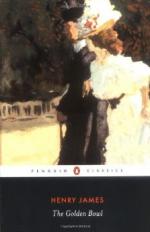ideally conclusive, so that no ghost of anything it
referred to could ever walk again. What was the
ecstasy of that, however, but in itself a trifle compromising?—as
truly, within the week, Maggie had occasion to suspect
her friend of beginning, and rather abruptly, to remember.
Convinced as she was of the example already given
her by her husband, and in relation to which her profession
of trust in his mistress had been an act of conformity
exquisitely calculated, her imagination yet sought
in the hidden play of his influence the explanation
of any change of surface, any difference of expression
or intention. There had been, through life, as
we know, few quarters in which the Princess’s
fancy could let itself loose; but it shook off restraint
when it plunged into the figured void of the detail
of that relation. This was a realm it could people
with images—again and again with fresh
ones; they swarmed there like the strange combinations
that lurked in the woods at twilight; they loomed into
the definite and faded into the vague, their main
present sign for her being, however, that they were
always, that they were duskily, agitated. Her
earlier vision of a state of bliss made insecure by
the very intensity of the bliss—this had
dropped from her; she had ceased to see, as she lost
herself, the pair of operatic, of high Wagnerian lovers
(she found, deep within her, these comparisons) interlocked
in their wood of enchantment, a green glade as romantic
as one’s dream of an old German forest.
The picture was veiled, on the contrary, with the dimness
of trouble; behind which she felt, indistinguishable,
the procession of forms that had lost, all so pitifully,
their precious confidence. Therefore, though
there was in these days, for her, with Amerigo, little
enough even of the imitation, from day to day, of
unembarrassed references—as she had foreseen,
for that matter, from the first, that there would
be—her active conception of his accessibility
to their companion’s own private and unextinguished
right to break ground was not much less active than
before. So it was that her inner sense, in spite
of everything, represented him as still pulling wires
and controlling currents, or rather indeed as muffling
the whole possibility, keeping it down and down, leading
his accomplice continually on to some new turn of
the road. As regards herself Maggie had become
more conscious from week to week of his ingenuities
of intention to make up to her for their forfeiture,
in so dire a degree, of any reality of frankness—a
privation that had left on his lips perhaps a little
of the same thirst with which she fairly felt her
own distorted, the torment of the lost pilgrim who
listens in desert sands for the possible, the impossible,
plash of water. It was just this hampered state
in him, none the less, that she kept before her when
she wished most to find grounds of dignity for the
hard little passion which nothing he had done could
smother. There were hours enough, lonely hours,




